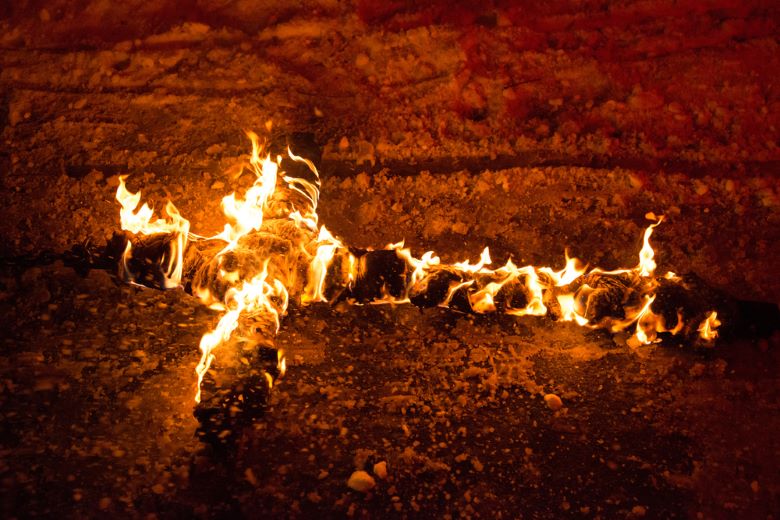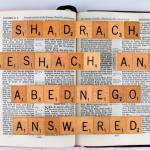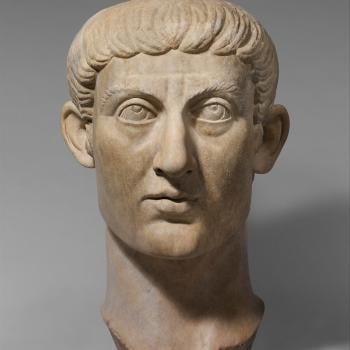
I’ve met thousands of people who cannot stomach the Bible because of its violence. Some stories portray God ordering horrible violence. Sensible people want nothing to do with a violent God. I get that. For me, the Bible is a collection of texts written by humans, even if Divine Inspiration somehow super-charged the composition process. People are violent, so I’m not surprised that people produce violent stories. I can deal with violent stories. Violent Christians really scare me, though. I stayed away from from Christianity for years, knowing how much violence Christians have perpetrated.
I didn’t identify as Christian for fifteen years of my adult life. Certain questions haunted me. How could Christians enslave Black people? Lynch their neighbors before church? (Yep. That happened.) Seize Native-occupied land and force-march Native people to death? Take Native American children from loving families? How did the German Christian Church support the Third Reich? How can Klansmen and Klanswomen burn crosses to terrorize their neighbors? As a Christian, I don’t want to ignore these questions, especially as Americans experience a resurgence of white Christian nationalism.
Christianity and Race
I check off the “white/caucasian” box on government forms. But I don’t feel guilty while contemplating racist violence. I subscribe to a metaphor Isabel Wilkerson proposes in Caste, her book about race in America. Wilkerson suggests that what Americans call race is a caste system, like the one in India. The race-based American caste system, according to Wilkerson, is like an old house you inherited from your family. The house may sit on beautiful land, but its foundation has cracks and its walls sag. None of us were here when this house was built, but we’ve inherited it. It’s now our responsibility to stop further deterioration and turn it into a structure that can shelter future generations.
As long as I am contributing to this construction project, I have no cause for personal shame. I cultivate hope that Americans may yet build something just. I also hope that Christian traditions can contribute to this project, despite having damaged the house. For Christianity to be a positive social force, white Christians who love their neighbors need to confront biblical interpretations that serve racist agendas. Christians who love their neighbors must teach and learn Bible-reading practices that support the flourishing of all Americans.
How to Avoid Racist Bible Interpretation
Historically, racist Bible interpretation fueled white Christian violence. In North America, European and Euro-American “Bible-believing” Christian colonizers used the Book of Joshua to imagine themselves as Israelites in a new Promised Land. In that story, Joshua and his army use terrifying violence to seize that Promised Land from the Canaanites. Settlers like John Winthrop reasoned that Euro-Americans should also use terrifying violence to seize land from Native Americans. And they did.
White enslavers used the “Mark of Cain” and the “Curse of Ham” passages (Genesis 4:15 and 9:25) to justify enslaving Black and Native peoples. White Christian pastors hammered enslaved Black persons with verses like Ephesians 6:5 (“Slaves, obey your earthly masters with respect and trembling, in singleness of heart, as you obey Christ . . . “) or 1 Peter 2:18 (“Slaves, in reverent fear of God submit yourselves to your masters, not only to those who are good and considerate, but also to those who are harsh.”) You can see similarly problematic verses here. Bible-reading Christians looking to resist racism and violence can promote reading strategies that minimize toxic interpretation.
5 Reading Strategies
These 5 reading practices can prevent toxic Bible interpretation:
- Reading without sensitivity to cultural context is dangerous. Learn about ancient history, politics, and culture: Mesopotamia, Greece, Rome. Learn about ancient Jewish culture, especially if you want to understand the Jesus phenomenon.
- Remember that the Bible, even if it is somehow inspired by God, was written by humans, who have ethnic and gender biases, combined with anxieties about sexuality.
- Never quote a Bible verse in isolation. Read entire books and consider how each book relates to other books.
- Read with people who don’t think like you. Get outside your demographic bubble.
- If you find yourself feeling smug or self-satisfied as a result of your Bible reading, assume you have missed the point.
On the Wild Olive podcast, which I host with biblical scholar Jennifer Bird, we practice these 5 principles. We also also amplify the voices of BIPOC writers, who know how to read against the grain of the dominant culture. Since biblical allusion is a form of biblical interpretation, Wild Olive often features contemporary BIPOC, queer, and women poets whose writing contains biblical references. Contemporary writers whose work engages with the Bible challenge readers to consider familiar stories from new angles.
Reading while Black (Or White, Native, Male, Female, Non-Binary)
Wild Olive also makes use of work by Black and Native scholars. Esau McCaulley’s Reading while Black and other books by Black biblical scholars illustrate how race affects biblical interpretation. McCaulley and scholars like him enable Bible-readers to understand the power of social location. Our social identities affect what we notice when we read. Until I read Wilda Gafney’s Womanist Midrash and Delores Williams’s Sisters in the Wilderness, I never realized that in the Abraham/Sarah/Hagar stories, Hagar is an enslaved African! Once I started reading with these two things in mind–enslavement and Africanness–the story acquired new meaning.
Reading Native American writers like M. Scott Momaday, Joy Harjo, Sherman Alexie, or Deborah Miranda helps me understand how whiteness and Christianity look from Native perspectives. Queer perspectives reveal nuances to biblical passages that I don’t notice on my own. Tony Kushner’s play Angels in America, for instance, identifies homoerotic overtones in the scene where Jacob wrestles an angel. I never noticed that.
Decolonizing the Bible and Christianity
Reading widely and diversely provides a way for white Christians to practice what biblical scholar Miguel de la Torre calls decolonizing Christianity. Decolonizing means working to undo the harm white Christian racism has done. Undoing this harm includes recognizing Bible-reading strategies that support the domination of one group by another.
Author and pastor Lisa Sharon Harper declares “If the first five hundred years after the Reformation was about the democratization of our faith, then the work of the next five hundred years will be its decolonization.” (See Foreword to Angela Parker’s If God Still Breathes, Why Can’t I?) We can participate in the decolonization process by becoming aware of our reading lenses. As a predominantly European-descended woman raised Catholic, I want to understand how my whiteness, my Italian-ness, my French-ness, my Catholic childhood, Quaker adulthood, and middle-class circumstances affect the way I understand the Bible.
Christianity, Whiteness, and the Bible
The early Christian church started as a minority countercultural movement and then became an arm of the Roman Empire. When that happened, Europeans began using the Bible and Christianity for the acquisition of political and social power. This power grab involved malignant ideas: that the Bible authorizes European and Euro-American Christians to seize land, enslave human beings, and generally set themselves up as masters of the universe. “Whiteness” starts with this bogus claim to superiority.
It’s unhealthy when members of a dominant group use Christianity or the Bible to pursue political power or social advantage. White Christian power-mongering leads to hate and violence. Healthy Christians use the Bible and Christian tradition to pursue the power to love, forgive, suspend judgment, embrace outsiders, endure pain, and sacrifice selfish ambitions to serve collective goods. Jesus tasked his followers with loving their neighbors and their “enemies,” defined as people from other ethnic, religious, or cultural groups, especially where there is a history of conflict between the groups.
Taking Action
Christianity acquired a serious moral credibility problem when Christians began using the Bible to vilify rather than love their neighbors. However, violent Christians can only operate when Christians who actually like their neighbors fail to get involved. Neighbor-loving Christians racialized as white should speak up when other Christians use the Bible or religion to advance white nationalism, racism, violence, and terror. To learn more about how to take action, visit Christians Againt Christian Nationalism.













